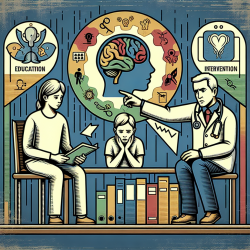As a practitioner working with children, you are on the front lines of identifying and addressing mental health issues. A recent study titled Combined pattern of childhood psycho-behavioral characteristics in patients with schizophrenia: a retrospective study in Japan provides groundbreaking insights that could transform how we predict and intervene in cases of schizophrenia.
The study reveals that certain psycho-behavioral characteristics in children aged 6-8 can predict the later development of schizophrenia. These characteristics include:
- Withdrawal
- Thought problems
- Lack of aggressive behavior
These findings were derived from a modified version of the Child Behavior Checklist (CBCL) filled out by the guardians of 54 patients diagnosed with schizophrenia and 192 healthy controls. The results showed that children who later developed schizophrenia had significantly higher scores in the aforementioned areas, although still within the clinically normal range.
Here's how you can implement these findings in your practice:
- Early Screening: Use the CBCL to screen for withdrawal, thought problems, and lack of aggressive behavior in children aged 6-8. Early identification can lead to timely interventions.
- Intervention Strategies: Develop tailored intervention strategies focusing on social skills and cognitive development to address these early signs.
- Parental Involvement: Educate parents about these early signs and the importance of early intervention. Their involvement is crucial for effective monitoring and support.
- Further Research: Encourage further research and longitudinal studies to validate these findings and improve predictive models.
Implementing these strategies can significantly improve the outcomes for children at risk of developing schizophrenia. Early intervention can make a world of difference.
To read the original research paper, please follow this link: Combined pattern of childhood psycho-behavioral characteristics in patients with schizophrenia: a retrospective study in Japan.










